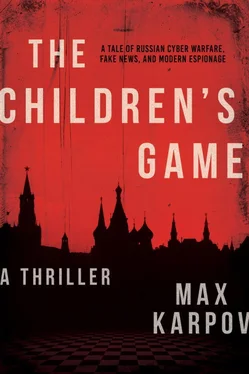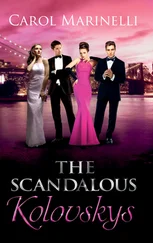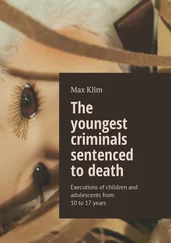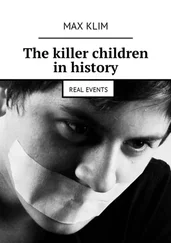He was showing off. Using the kind of langauge he’d heard Ivan Delkoff use. He could get away with it because he was talking to Pletner, who was twenty-one and didn’t know war. Delkoff had always encouraged Zelenko—too much, he now realized; he’d probably helped give him the sort of confidence that would only get him in trouble. A prideful confidence.
But this wasn’t just pride. Zelenko was also nervous, more than he should’ve been. Nervous about something besides the mission. A man talks when he’s no longer at peace with his thoughts. Something he had read once.
Delkoff flicked away the last of his cigarette onto the barn floor and crushed the embers with his boot before going out. He squinted into the sun, feeling the afternoon heat on his face, smelling the odor of his own body.
Zelenko stiffened, seeing him, but Delkoff smiled and they all turned to the fields, waiting for a breeze to rustle the sunflower stalks.
“We ready?” Delkoff asked Pletner.
Pletner was a tall man with broad, blunt features—but the acquiescent eyes and bright teeth of an innocent, largely indistinguishable from other young men of the same age.
They set out again in silence, Pletner driving the camouflage Tigr reconnaissance truck along the unpaved farm road, more comfortable behind the wheel than anywhere else, as dust boiled up behind them in the heat. They rode past untended corn and onion farms, two-room wooden cottages, an unexploded missile jutting from a front yard, a combine, a schoolhouse with a Swiss-cheese pattern of artillery holes in one wall. Interrupted lives. Ukraine was the world’s largest producer of sunflower oil, but many of the farms and seed-crushing plants in Donetsk territory had been abandoned this summer. The barn where they’d stopped for lunch now stored Grad rockets and mortar shells.
Delkoff sat in back, thinking of his family and the war, as he always did, and of those places where the two had intersected. But at the same time he watched Zelenko, giving him a hard smile each time he turned around.
For Ivan Delkoff, the war was more than a quarter century old now. It had begun the night the Soviet flag was lowered for the last time outside the Kremlin. December 26, 1991. On Friday afternoon, it would move to a new front, in the farmland north of here. The Americans, naturally, didn’t know this. The Americans’ war had ended just as Russia’s was beginning. They’d been so busy high-fiving each other they failed to understand Russia was never going to roll over and become “Westernized.” They’d wanted a simple outcome to the so-called Cold War, something resembling one of their action films—the good guys win, the Russians lose—and arrogantly assumed that American “democracy” could be exported around the world like a fast-food franchise. But Russia was a great and complex country, with traditions that most Americans, with their truncated attention spans, did not understand. When no one bothered to correct them, they assumed they’d won, having no idea how resilient and unusual the Russian spirit could be. The Americans had been asleep all these years—as Andrei Turov had told him in the spring—inviting retaliation.
Delkoff thought of his father—bureaucrat, soldier, patriot—who had ingrained these nationalist ideas in him, holding court with Delkoff and his brother in the living room of their tiny south Moscow apartment, drinking vodka from a fruit jar and talking of the Soviet victory over Hitler in the Great Patriotic War. A man Delkoff would never resemble, except in that fundamental belief in Russian greatness. Delkoff thought of the battles in his own life that had led him here, beginning with Transnistria in 1992, the two wars in Chechnya, and the failed secret operation in Estonia five years ago. He remembered the battles his son had fought in the Donbas, and his thoughts returned, inevitably, to the one that had killed him on that rainy afternoon near Lugansk last summer—the stupid ambush—and he felt angry all over again.
It was nearly dusk when they reached the farm property that would serve as the command post for Friday’s operation. Delkoff undid the padlocks on the warehouse doors and they pulled the truck inside, parking it next to the TAR—a target acquisition radar, the tank-like vehicle Delkoff had transported here two weeks ago.
In the back of the warehouse was Delkoff’s makeshift office. He’d moved in a cot, a desk, and several folding chairs, along with a small refrigerator and steamer trunk. In the trunk was a ten-liter jerry can filled with gasoline, an automatic rifle, a Makarov handgun, a scout combat knife, and a bag containing his change of clothes, money—both euros and Ukrainian hryvnias—as well as three passports and a simple disguise Delkoff had purchased from a Moscow costume shop.
In six and a half hours, the unmarked trucks from the north would arrive, after passing through Ukrainian-controlled territory, with the missile launcher and the mobile command post. The equipment and transports would be stored here beside the TAR until Friday afternoon, when history would change. When Delkoff’s battalion would at last open a “new front.”
The three men sat on folding chairs in the farm road that night as the air cooled, stars glistening above the sunflower fields. Delkoff went through the operation details again and talked about battles he’d fought, in Transnistria and Chechnya, while Zelenko and Pletner listened, reserved and attentive.
But Zelenko was looking at Delkoff a little strangely tonight. Lowering his eyes just a moment too soon several times. And that told Delkoff what he needed to know.
No, Zelenko wasn’t like his son, after all. It wasn’t even close.
By the time the other two men retired to the basement of the farmhouse for a few hours of sleep, Delkoff had made up his mind. It was all there in Zelenko’s eyes: the reason he was acting so nervous today wasn’t because of their mission; it was because of what he planned to do afterward.
Delkoff had dissected Turov’s plans enough by then to know that at some point they would involve a secret assassin. Delkoff knew too much to be allowed to survive, despite the magician’s assurances. And Zelenko, by appearances the most unlikely man for the job—small, timid, sneaky in a transparent way—must have been his choice, for that very reason. Zelenko was Turov’s assassin.
“Get a few hours of sleep,” he said, patting Zelenko on the shoulder. “I’ll wake you when they arrive.”
Wednesday evening, August 11. Northern Virginia.
Walking alone from customs into the main terminal building at Dulles International Airport, Anna Carpenter felt a vague uneasiness, a sense that something was coming, something people weren’t ready for. Maybe it was just the contrast between Martin Lindgren’s urgency and the sleepy city that she was returning to. Washington officially closed for business at the end of July for a five-week summer “recess.” Members of both houses of Congress returned to their home states for the month or went on vacation. No legislation was passed, there were no committee meetings. The Supreme Court was on hiatus. Even the president was in the midst of a two-week holiday. If someone wanted to catch America asleep at the switch, August would be a pretty good time to do it.
Mixed with these uneasy feelings were more personal concerns, which Anna had been fighting ever since leaving Christopher in Greece. It still bothered her how quickly the Turov assignment had gotten into his bloodstream. Martin had given him a taste again, and she’d seen the transformation. A reminder of how his work could turn Christopher into someone she barely recognized: compulsive, single-minded, emotionally detached. His father had given him that. Chris and his half brother were the products of a brilliant but demanding man who’d set unrealistic standards for his sons; he’d been an influential figure in the counterintelligence community for three decades, recipient of a Distinguished Intelligence Medal. People now routinely referred to Carroll Niles as a “gentleman” spy; but he’d also been a taskmaster, a remote figure who rarely praised his sons, who’d waged his own war with the Washington bureaucracy. In the weeks after Anna met Chris, she sometimes felt that he was still fighting his father’s unfinished battles.
Читать дальше












